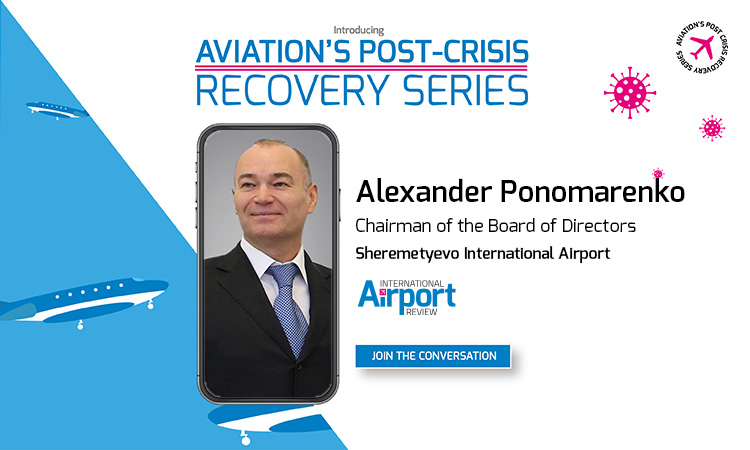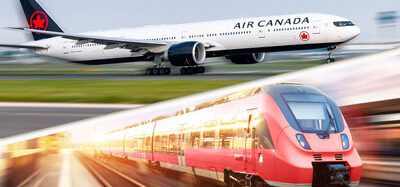Aviation’s Post-Crisis Recovery Series: Sheremetyevo International Airport
- Like
- Digg
- Del
- Tumblr
- VKontakte
- Buffer
- Love This
- Odnoklassniki
- Meneame
- Blogger
- Amazon
- Yahoo Mail
- Gmail
- AOL
- Newsvine
- HackerNews
- Evernote
- MySpace
- Mail.ru
- Viadeo
- Line
- Comments
- Yummly
- SMS
- Viber
- Telegram
- Subscribe
- Skype
- Facebook Messenger
- Kakao
- LiveJournal
- Yammer
- Edgar
- Fintel
- Mix
- Instapaper
- Copy Link
Posted: 26 March 2021 | Alexander Ponomarenko | No comments yet
Alexander Ponomarenko, Chairman of the Board of Directors of Sheremetyevo International Airport, writes that, while Sheremetyevo has not been immune to the impact of COVID-19 as seen in airports around the world, he is positive of a swift return to pre-pandemic air travel in the next instalment of International Airport Review’s exclusive series.


The COVID-19 pandemic has been completely unprecedented in its impact on the aviation industry. How has it impacted Sheremetyevo International Airport?
Sheremetyevo International Airport (SVO) found itself in a difficult situation, like all major airports. Passenger traffic decreased by 60.4 per cent. Takeoff and landing operations decreased by 51.8 per cent.
Most of the decline – 76 per cent – was among international airlines. The domestic market is recovering faster and was at 42.5 per cent by the end of 2020.
Destinations, route network and passenger flights were reduced, but cargo traffic through Sheremetyevo in 2020 decreased by only 13.7 per cent when compared to 2019. We retained our position as the largest cargo air hub in Russia. Total cargo handled at the airport amounted to over 299,100 tonnes, and mail was 28,300 tonnes.
The COVID-19 pandemic also affected the types of transported goods. During 2020, our main cargo operator, Moscow Cargo, handled about 20,000 tonnes of international medical cargo, almost 70 per cent more than in 2019. Since November 2020, Moscow Cargo has provided services for shipping the Sputnik V vaccine, both in Russia and abroad.
What immediate changes did you have to make in response to the pandemic, and what did you find the hardest problem to tackle?
Sheremetyevo was the main Russian airport serving flights from epidemiologically unfavourable countries. From March to September 2020, we received 236 flights with 50,000 returning citizens. That includes a unique repatriation flight from seven African countries with 197 Russians, as well as citizens of Ukraine and Kazakhstan.
Airport management was acutely aware of the airport’s role in preventing the spread of coronavirus”
Airport management was acutely aware of the airport’s role in preventing the spread of coronavirus, and we cooperated with government and doctors on a large-scale set of preventive measures.
We also developed a set of anti-crisis measures. All non-production costs were significantly reduced, production resources were redistributed and technological processes were optimised. Three out of five passenger terminals and Runway 3 were temporarily decommissioned, and staff work schedules were optimised. Senior management voluntarily gave up more than 60 per cent of their annual remuneration.
Sheremetyevo was also the first airport in the world to launch rapid COVID-19 testing in July 2020 and, in January 2021, a publicly available area for COVID-19 vaccination was opened.
What initiatives are you focusing on in 2021 to restore passenger confidence?
The world has been fighting the pandemic for over a year now, and the public has become aware of the necessary security measures. Personal protective equipment (PPE), social distancing and testing are part of our everyday lives. Our main hope is that we will achieve herd immunity as people recover from the disease and get vaccinated.
We are conducting a massive campaign to inform our guests about security measures at the airport”
We do not expect the complete lifting of global restrictions on air travel. But, as the summer of 2020 has shown, the Russian market is recovering faster than the world average.
We are conducting a massive campaign to inform our guests about security measures at the airport. We hope that they fully understand and appreciate the care that we are taking for their health while they are in our terminals, and we have seen strong demand for restoring passenger traffic. Passenger confidence in the measures implemented at Sheremetyevo is now very high.
What other exciting projects/developments are in the pipeline at Sheremetyevo International Airport to help cope with increased passenger numbers once air travel begins to pick-up again?
Sheremetyevo Airport has the largest terminal and airfield infrastructure in Russia, as well as the production resources and personnel to support the increasing volumes of passenger and cargo traffic. At the beginning of 2020, we commissioned the international Terminal C, designed for 20 million passengers per year. Terminal C is integrated into a single complex with Terminal B.
We managed to integrate all of our actions related to ensuring safety into the daily life of the airport in a way that did not affect the level of service quality at Sheremetyevo”
In December 2020, the first runway was commissioned after a complete reconstruction, and the capacity of the airfield complex increased to 110 million passengers per year. Runway 1 was built in record time – just 10 months – despite the pandemic.
We managed to integrate all of our actions related to ensuring safety into the daily life of the airport in a way that did not affect the level of service quality at Sheremetyevo. This was borne out by our top rating for 2020 in Airports Council International’s (ACI) Airport Service Quality (ASQ) rating of the largest airports in Europe.
Are there any initiatives that you have implemented during the COVID-19 pandemic that you will permanently integrate into your airport’s strategy, even once the crisis has passed?
Right now, the services are focused on testing and vaccination, but we are negotiating with medical institutions about long-term cooperation on a wider range of services”
The priority for the near future will be to ensure the sanitary and epidemiological safety of transportation at the airport and on board the aircraft. Measures such as disinfection, shortening the lines and touch-free and online services are what will definitely survive the COVID-19 pandemic. The development of health services at the airport presents an interesting opportunity. Right now, the services are focused on testing and vaccination, but we are negotiating with medical institutions about long-term cooperation on a wider range of services.
Anti-epidemic measures were implemented at Sheremetyevo Airport in accordance with the requirements and recommendations of state authorities, international organisations and health institutions. They are temporary in nature and will be cancelled once the pandemic ends by the decision of the responsible government departments. It is strategically important to properly understand the experience that we’ve gained and reflect it in the regulations and technologies of the airport in the event that a new global pandemic occurs.
What business activity are you forecasting for Sheremetyevo International Airport/ what is your business outlook?
We are targeting a 40 per cent increase in traffic volume for 2021 compared to 2020. If all goes well, we expect passenger traffic to return to pre-pandemic levels in 2022-2023.
The destinations that the airport will serve may also change. People will tend to travel to countries with the most favourable environment, or where safety/ hygiene measures are higher. This could affect how travellers weigh price against other factors to determine value.
The emergence of remote working and online communications is likely to reduce the growth of business travel. The wealthy may move to individual flights, and we could see a new segment of flights in which a business jet is leased by a small group of people.
Our mid-term goals include the tighter integration of airport services with airlines and other partners. We also expect a number of new foreign airlines in 2021. Air India has resumed regular weekly flights, and Pobeda Airline, the largest Russian low-cost airline, will begin service from Sheremetyevo in May 2021.
Alexander Ponomarenko is a self-made businessman who earned his fortune in Russia in the years following the dissolution of the Soviet Union. He was born in 1964 and began his business career in the late ‘80s and, after two decades, was listed among the wealthiest people in the world, with a fortune of more than three billion dollars. Over the course of his career, he has built several successful businesses in banking, commercial real estate, seaports and airports. Today, Ponomarenko is engaged in development and is Chairman of the Board of Directors of Sheremetyevo International Airport, the largest airport in Russia, serving more than 49 million passengers in 2019.
Related topics
Aeronautical revenue, Air freight and cargo, Airport construction and design, Airport crisis management, Airside operations, Aviation's Post-Crisis Recovery Series, COVID-19, Non-aeronautical revenue, Passenger experience and seamless travel, Passenger volumes, Safety, Terminal operations


















